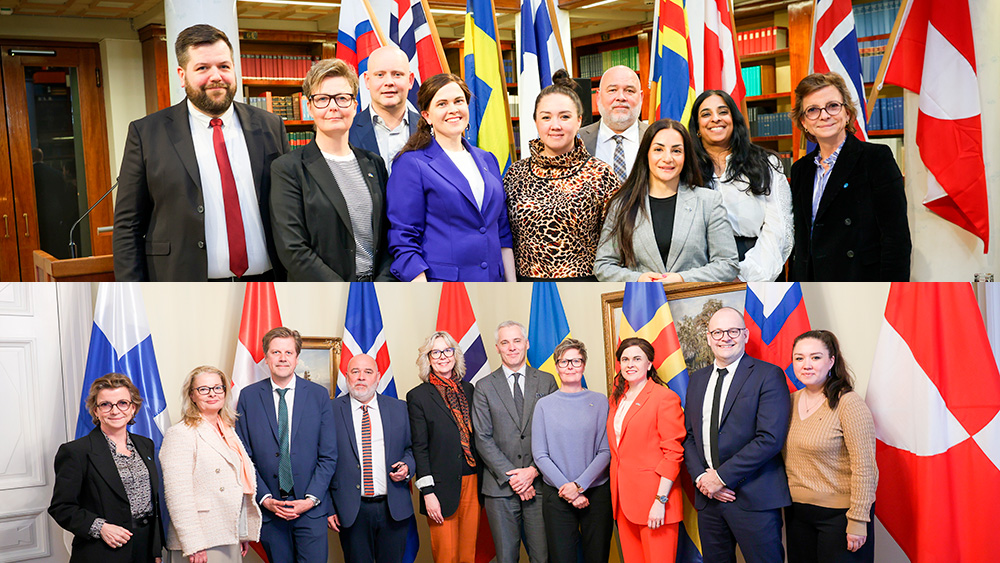Nordic ministers meet in Helsinki to discuss resilience, protection of cultural heritage and skills development

The Nordic ministers of culture and ministers of education and science met in Helsinki on 5 and 6 May as part of Finland's and Åland's 2025 co-presidency of the Nordic Council of Ministers.
The key themes were culture and security at the meeting of the Nordic Council of Ministers for Culture on 5 May. The meeting discussed the role of culture in comprehensive security, and the need for multidisciplinary dialogue in contingency planning and preparedness.
The ministers paid particular attention to how wider Nordic-Baltic cooperation could improve the protection of cultural heritage in a crisis or war. The ministers decided to continue to provide financial support for a project under which Ukrainian artists and cultural actors can stay in Nordic-Baltic artist residencies. The project is managed by the Nordic Culture Point, which was responsible for the project in 2022–2024.
“I consider it important that, under the leadership of Finland and Åland, we have opened a discussion on the role of culture in strengthening community resilience. At the same time, we have decided to explore possibilities for broader Nordic cooperation to strengthen the role of culture in comprehensive security,” said Finland's Minister of Science and Culture Mari-Leena Talvitie.
Strengthening skills and exploring impacts of artificial intelligence
At the meeting of the Nordic Council of Ministers for Education and Research on 6 May, the ministers discussed improving learning outcomes in primary and lower secondary education, with a particular focus on strengthening educational equality and providing a learning environment that would better support learning.
The Nordic Council of Ministers Co-operation Programme 2025–2030 emphasises the importance of a good educational pathway and basic skills in the Nordic region. The Council will deepen cooperation in these areas by investing in the search for Nordic analysis and solutions through closer cooperation between experts and by leveraging international and national educational evaluations from the Nordic countries.
The ministers discussed research, education and skills needs arising from the rapid development of artificial intelligence (AI) and how the Nordic countries can respond to them. The Nordic countries have excellent opportunities to take the lead in science and technology to harness the opportunities offered by the digital transformation and AI.
“Ensuring a strong level of competence and education across the population and a well-functioning society provide the best protection in a changing world. It is important to keep everyone involved in this development and, at the same time, to ensure that the Nordic region can meet future skills needs,” said Finland's Minister of Education Anders Adlercreutz.
Åland's Minister of Education and Culture Annika Hambrudd attended both ministerial meetings.
“I am pleased that the debate on Nordic cooperation in both culture and skills will continue this autumn. In October, Åland will hold a Nordic-Baltic conference in Mariehamn on illicit trade in cultural property and the protection of cultural heritage in times of peace,” said Minister Hambrudd.
“It is also of paramount importance that our Nordic cooperation continues to strengthen skills and respond to skills needs, promoting the mobility of skills, research and people between countries and sectors,” she added.
Finland and Åland are holding the Presidency of the Nordic Council of Ministers in 2025. The key theme of the Presidency Programme “Nordic Region 2025: United and Strong" is the concept for comprehensive security, including preparedness for crises and stronger resilience. Other key objectives are to advocate the rights of children and young people and to increase wellbeing and inclusion in the Nordic region.
The Nordic Council of Ministers is guided by the prime ministers' shared vision for the Nordic region to be the most sustainable and integrated region in the world by 2030.
- Photos from the meeting of the Council of Ministers for culture (Flickr)
- Photos from the meeting of the Council of Ministers of Education and Research (Flickr)
- Programme for Finland's and Åland's Presidency 2025
Inquiries:
Culture: Riitta Heinämaa, Senior Ministerial Adviser, Culture, tel. +358 295 330 090
Primary and lower secondary education: Sini Keinonen, Senior Specialist, tel. +358 295 330 298
Research: Saara Vihko, Senior Ministerial Adviser, Education, tel. 0295 330 005
Higher education: Marjo Vesalainen, Senior Ministerial Adviser, Education, tel. 0295 330 352

